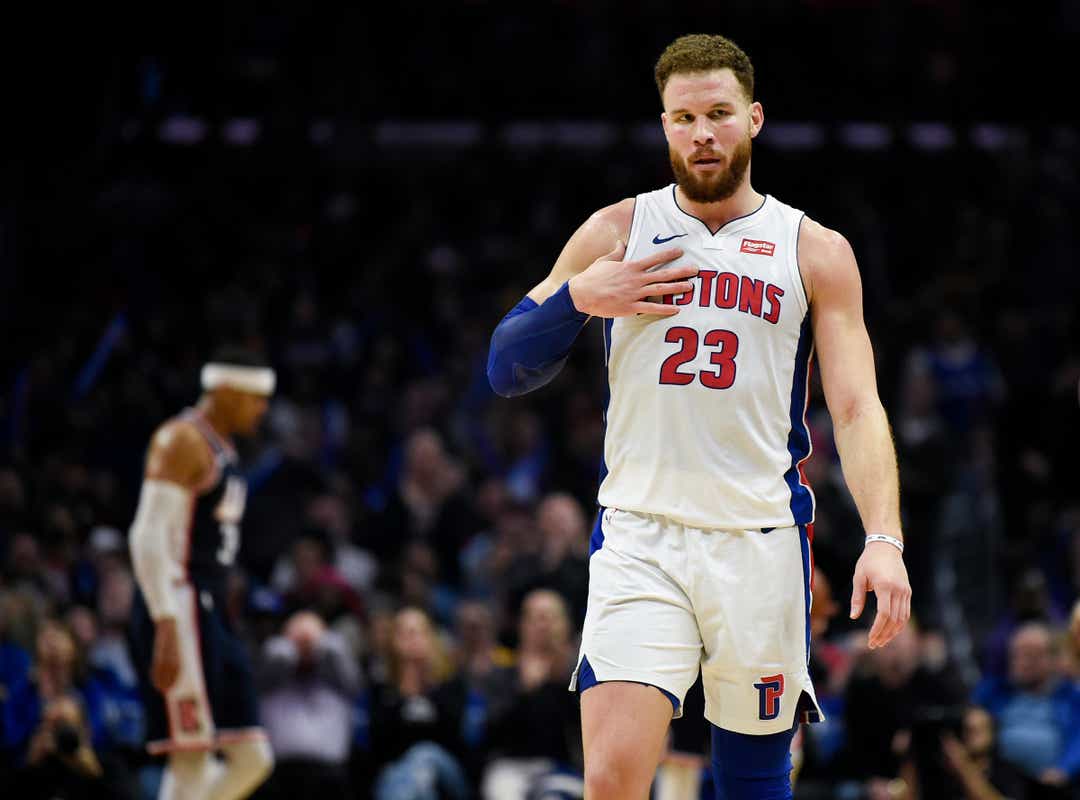Between his rehab sessions, Blake Griffin has been watching the NBA’s return within the Orlando bubble. He has been impressed by the comprehensive plan put in place by commissioner Adam Silver and league officials to keep everyone within the bubble safe, as the pandemic continues to wage war on the country.
On Wednesday, the league announced a fourth consecutive week of no players testing positive for COVID-19 — a major accomplishment.
“Obviously, I’m biased,” the Detroit Pistons star said, “but the NBA does an incredible job of being the leaders when it comes to things like this. Adam Silver and the NBPA did a great job of coming up with a plan and executing, having protocols in place, being smart about it, taking it very seriously, spending the money and you can see when you’re thoughtful about something and you’re willing to put in the time and the effort and the resources, it’s probably going to work.”
[ The Free Press has started a new digital subscription model. Here’s how you can gain access to our most exclusive Detroit Pistons content. ]

Griffin has been less impressed by the NBA’s efforts to assist players in drawing attention to social justice issues. The National Basketball Player’s Association pushed the league to find ways to amplify players’ voices within the bubble, and the league obliged. “Black Lives Matter” was added to the courts to appear on television during games, and 29 phrases were approved that players can wear on the backs of their jerseys.
Some have been underwhelmed by the NBA’s efforts. Count Griffin among them.
“I think it’s something. Can they do more? Absolutely,” he said. “But it’s a start. Put whatever you want on the back of your jersey, well not whatever you want. Put 27 pre-approved messages on the back of your jersey. Black Lives Matter on the court. It’s a start. But just putting words on a floor isn’t necessarily going to bring about real change. It has to also be followed through and there has to be a plan in place to support the idea of that. It sounds like they’re working on that, but we’ll see.”
In a summer that largely has been defined by the protests following the killings of Breona Taylor, Ahmaud Arbery, George Floyd and other unarmed Black Americans, Griffin has joined a chorus of athletes who have been using their platforms to impact change.
He has been active on social media, lending support to protesters and various movements on Instagram and Twitter. He also joined a protest in Los Angeles, where he lives during offseasons.
“If you can’t understand the simple concept that America, for years, Black lives have been not given the same respect or even just basic civil rights as others, then you just looked at this the completely wrong way or you’ve turned a blind eye or you just don’t want to see it,” Griffin said. “That said, I’m inspired by how many people have come together for this movement and obviously I support that in any way I can.”
[Blake Griffin feeling ‘world of difference’ in left knee, is optimistic for 2020-21 season ]
Griffin also has advocated for a cause much more personal to him. Along with a coalition of activists and athletes, he is working to bring clemency to Julius Jones, an Oklahoma Black man on death row for a crime he and his family claims he didn’t commit.
According to ESPN, Jones filed a clemency report in October 2019 requesting his sentence be reduced to time served. That report, along with several appeals, were denied.
Jones was a basketball player at Oklahoma City John Marshall High School who was convicted of first-degree murder in 2002 for the death of Paul Howell in 1999. Blake Griffin’s dad, Tommy, was his head coach.
Griffin, along with Oklahoma guard Russell Westbrook, Atlanta Hawks guard Trae Young and other athletes with Oklahoma times, have penned letters to Oklahoma Gov. Kevin Stitt’s office to support The Julius Jones Coalition, which is working toward Jones’ clemency.
Griffin and his older brother, Taylor, grew up watching Jones play. After watching “The Last Defense,” a docuseries about Jones’ trial, Griffin decided to get involved.
“Obviously my father coached Julius in high school, so have obviously known him for a long time,” Griffin said Wednesday. “As a kid when this happened, I didn’t really understand, or necessarily get all the facts. When this sort of came back up and I had an opportunity to use my platform, it was important to me.”
There hasn’t been any movement in Jones’ case, Griffin said. But he’s encouraged by the support the coalition has garnered. A change.com petition organized by the coalition has more than 6 million signatures, and several Oklahoma-based politicians and social justice organizations have penned letters to Stitt’s office.
“A lot of people have been speaking out,” Griffin said. “There’s been several people that have lended their voices or their time to the movement. I think that’s important, but we just have to stay with it.”
“There’s always going to be people that tell us that we shouldn’t have an opinion on things while everybody else gets to have an opinion on things, which is obviously very contradictory,” he added. “That’s not going to stop us or stop myself from speaking out on something that we think is wrong or right, whether you’re for or against it. I think we’ve had a positive movement recently and I don’t want that to die with things becoming a little bit more normal. The past, I don’t know. I spoke out on different things here or there, but I think it’s important to keep these reminders up every now and then that there has been some social injustice for a long, long time. Let’s keep it in the forefront, right?”